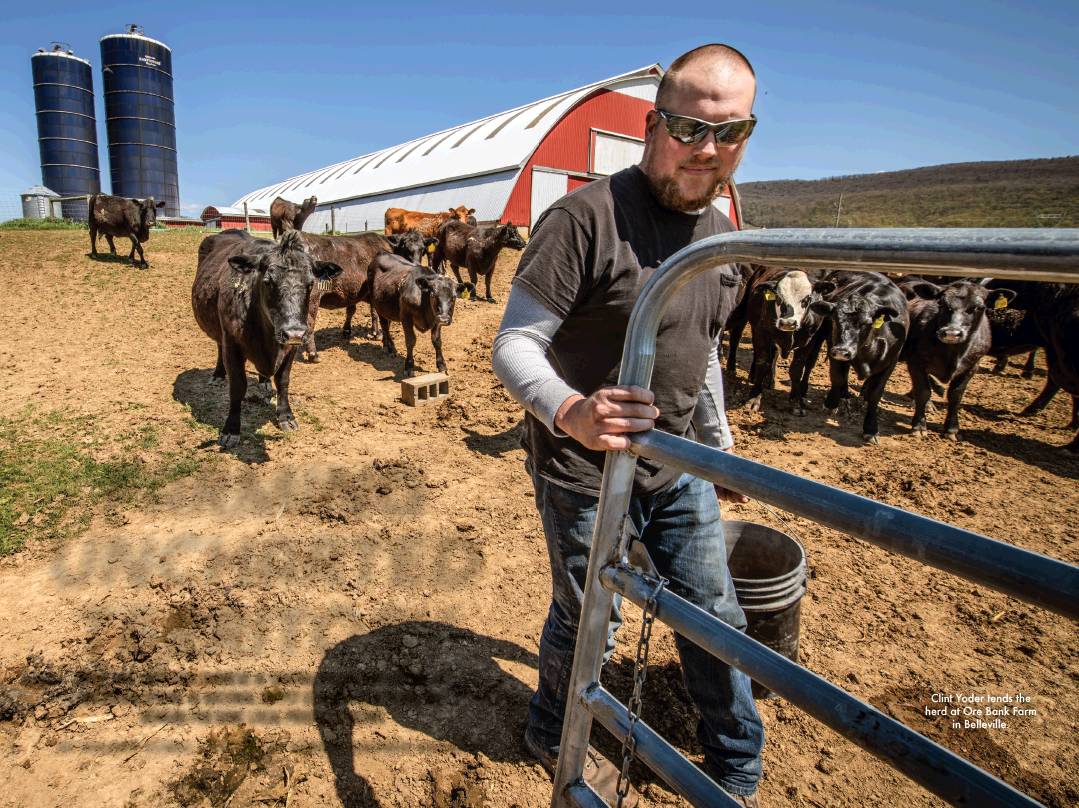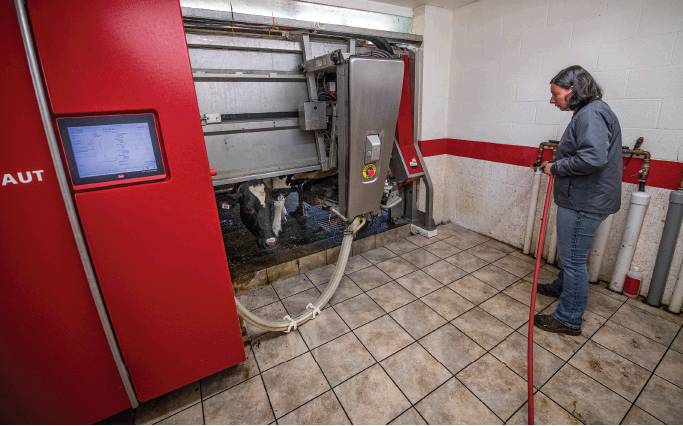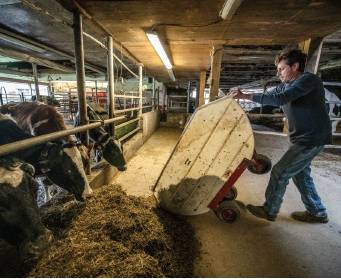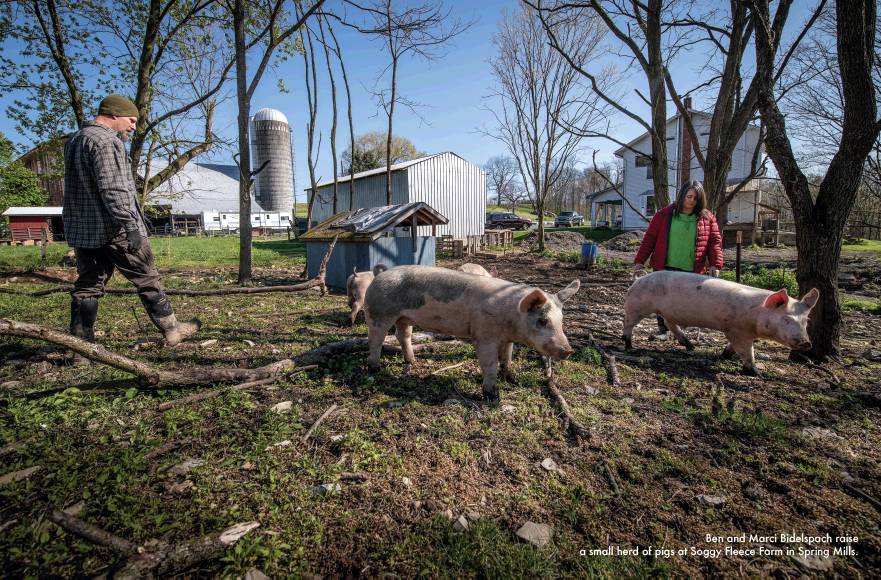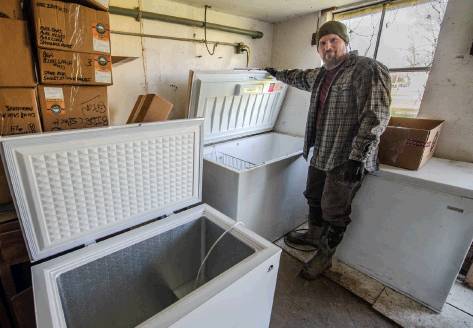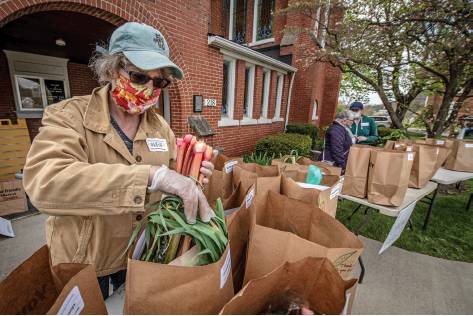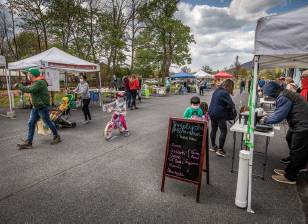Farming Uncharted Territory
Dairy and livestock farmers in central PA are navigating an uncertain spring as national supply chains break down and demand for some local products grows
By Vincent Corso • Photos by Darren Andrew Weimert
Spring is typically a highvolume time for dairy farmers in the region. As the weather warms up, operators of small farms are able to get their cows out to pasture more often, and because of the higher-quality feed and natural cycle of cattle, cows make more milk in the spring. This made the sudden impact of COVID-19 all the more difficult on dairy farmers.
“There is surplus milk in the spring and they call it the ‘spring flush,’” says Bethany Coursen, who with her husband, Adam, owns Valley Wide Farm, a thirdgeneration progressive dairy farm in Spring Mills that also produces beef. She is the former president of the Centre County Farm Bureau and is an advocate for dairy farmers.
“The spring flush was hitting as this COVID kind of hit at the same time, so there was a lot of milk with nowhere to go,” she says.
Nowhere to go, because schools closed and restaurants closed or cut back operations and therefore were not taking in their typical bulk orders. The system is not flexible in product utilization, and grocery stores were not set up to use those bulk milk products.
“With more people at home and buying dairy products, that is why store shelves were bare – the shift in consumer consumption,” says Virginia Ishler, dairy specialist with Penn State Extension. This is why some farmers had to dump milk, even while some grocery stores’ dairy cases were bare.
Coursen says while she is not aware of any farmers in Centre County dumping milk, there are those in surrounding counties who have had to do so, and it affects everyone in the dairy cooperative, a collection of dairy farmers who work together to bring milk and other products to market. A dairy co-op is owned and controlled by all members of the co-op equally. Members share in the profits and expenses of the co-op.
“There have absolutely been producers in the surrounding counties that have had to dump milk,” Coursen says. The coop “tried to focus on the producers that have the capability of handling the waste milk. So it is not like they went across the board and said every producer in this particular co-op needs to dump X number of gallons of milk. What they did is they went to a big-guy farm in Clinton County that has a digester that can digest and handle the waste milk better. They say you dump half of everything you make and then they spread it across so that everybody takes a cut in the paycheck, but he is the one dumping the product.”
The co-op also told local producers to limit production and are paying “pennies on the dollar” on anything over a set quota, says Coursen. “It is really bad; they are trying to do supply management, but it is not like the cow can just stop producing.”
Most local dairy farms are small, and limiting production is devastating, says Coursen. Margins at dairy farms are slim because the dairy industry was already in a crunch for the last five years because of trade wars that left farmers “caught in the crosshairs.”
“They are trying to do supply management, but it is not like the cow can just stop producing," Bethany Coursen says.
Coursen’s dairy works with an independent processor that supplies a grocery store. She says the processor has done a good job of supply management, but even with that in place their dairy still has been impacted.
“We all fall under the same pricing system. So even though I don’t have to dump, when the milk price drops $5 in a week per hundredweight, we are all going to feel that,” says Coursen.
Terry Rice, of Clover Creek Cheese Cellar in Blair County, says her family farm used to be in the co-op, but decided to go on independently when the co-op said a few years ago that it could no longer make cheese. While Clover Creek has been able to keep prices steady on its raw milk and cheese products, a $1,000 biweekly contract for a restaurant supplier in Pittsburgh was lost when the supplier shut down.
“But hey, hopefully they come back. But their whole business shut down once restaurants had to close,” says Rice. “So, that affected us negatively.”
Rice sells at farmers markets and at a stand on the farm; business has been brisk as consumers are looking for local products touched by fewer hands. But she is unsure if that demand will keep up as things go back to normal.
Her daughter is the state alternate dairy princess, and she says that some of her fellow dairy princesses report that their farms have been dumping milk once a week.
“It is just hurtful to hear that people have to do that,” says Rice.
Local meat in
demand
Clint Yoder, from Ore Bank Farm in Belleville, switched from dairy farming to raising Angus, organic grass-fed and finished beef five years ago. Previously, the farm sold beef online as it was ready, never selling out multiple months ahead of time. Recently, Yoder noticed people looking for local products in a much higher volume.
“It started taking off in February, actually,” he says. “I suspect it had to do with the amount of beef we are now importing and consumers wanting to know where their beef comes from. It certainly continued into March and April. I sold out for the year in the last week.”
Yoder adds that nationwide, beef prices in stores have soared, while the price for fat cattle has plummeted.
“All of this is obviously caused by the centralized massive processing facilities being forced to shut due to COVID-19 outbreaks,” he says. “Certainly, the big packing facilities were designed to be more efficient, but their flaws for reliable, stable supply have become evident.”
Chad Burke raises beef, pork, and chicken at Twin B Farms in Stormstown. He has had no trouble getting his meat to the local processor. Business has been brisk lately, but it is still a struggle to make a profit, he says. The farm sells online and through the farmers market, with social distancing in place.
“We actually are seeing an influx in business, because of the issue the larger farms are having,” says Burke.
The farm’s meat is prescheduled at his butcher for the year, but he is trying to get more meat processed to accommodate the extra business.
“But beef prices are down; everything is down on our end. Right now, you are looking at losing money,” he says. “The end result is you are going to be below breaking even. So why are you even planting if you are breaking even? But, as soon as things change, prices could go right back up. You just gotta hope that things straighten out when things go back to normal.”
Ben and Marci Bidelspach started Soggy Fleece Farm when their daughters, Chloe and Phoebe, became interested in farming through 4-H. Eventually, they moved from Bellefonte to Spring Mills and bought a farm there. They have a small herd of pigs that they raise and sell locally. They, too, have seen demand rise since the COVID-19 outbreak.
“The biggest problem now is getting animals into the butcher,” says Marci, but so far they have been able to do so without issue. Because they are small, they don’t have the ability to birth their herd, so they rely on raising feeder pigs. Those have been more difficult to come by and carry a higher cost.
Ben says he is considering birthing hogs in the future if this continues. They, too, would require additional equipment and facilities; but it might be a good way to offset rising costs of feeder pigs, costs they don’t want to pass along to consumers, he says.
With demand for local products high, Marci says she can’t imagine being in a position that some farmers have been in, having to cull animals because there’s no place to process them.
“This is a healthy animal that you have raised; I can’t imagine what it is like to see that go to waste. I don’t think I could do it,” she says. “But we are small enough, I would butcher it anyway and give it away if we had to. I would rather do that.”
The $64,000
question
“People should care about local farms,” says Centre County Commissioner Mark Higgins, “because I like to eat, we all like to eat, and without farms we are not eating.”
Higgins has been pushing for more local processors of dairy and meat products in COVID-19 outbreaks.
“A lot of our agriculture products travel hundreds and thousands of miles; there is nowhere to send the animals,” Higgins says. “It is bad enough with animals, but even worse with perishable products such as produce and milk.”
As contract-growers struggle with the decision of whether to cull animals, many small farmers in Centre County are trying to keep up with demand.
“There is a lot of local demand right now,” says Travis Lesser of the local food hub Appalachian Farm Works. “People are realizing that the closer their food is to home, the more they the region to increase jobs and prevent the shipping of products from Pennsylvania to get processed, only to come back to the state to be sold. Farmers who are contract-growers for large meat producers are having to wait to get their animals to processors that are backed up because of know about it, the more peace of mind they get from purchasing it from a local farmer. There are less hands that are touching it. Right now, that seems to be a big thing as far as demand goes.”
Lesser says smaller local processors are so busy that he worries they might burn out their workers.
“That is the tightrope that we are walking right now; people are buying more than they need, the supply is there, but if the processors can’t get people to come into work, or they are working so hard they are going to burn out,” says Lesser. “It is OK to stock up on stuff, but it is another thing to go into Giant and just take all the chicken.”
More farmers are finding ways to sell directly to consumers locally during the crisis, but some are more adept then others at that part of the business, he says.
Appalachian Food Works helps local farmers connect with people who are looking to keep it local. Typically, they do that with sales to the restaurant industry, which has become more focused on farm to table.
With restaurants closed or scaling back, Appalachian Food Works has teamed up with Food Locus LLC, a local food startup, to create a food hub ordering app called Dezi, where people can buy local products.
Farmers markets in Centre County, like the Boalsburg market on Tuesdays and the North Atherton market on Saturdays, are taking precautions to ensure that farmers have a place to sell their products directly to the public.
Sabine Carey owns a small farm and helps run the North Atherton Farmers Market in the parking lot of Home Depot.
“Each week, we tune in those requirements a little finer on shopper flow and preordering and all those sorts of things, because the demand has been growing. People are not finding what they are needing in local stores,” says Carey. “But now, we are getting a whole group of new shoppers who are discovering that, hey, there is actually local food.”
In March, she set up an online farmers market called Centre Markets (centremarkets.com) that allows shoppers to find local farmers and pick products up safely at the Boalsburg Farmers Market or Nature’s Pantry. She started with four vendors and has been adding a couple a week; the site was up to 19 vendors by mid-May.
Duke and Monica Gastiger opened Windswept Farm’s RE Farm Cafe with the idea of bringing the restaurant right to the farm.RE Farm was able to pivot when restaurants were shut down by efficiently transitioning to an online local market for prepared and fresh foods, in part because the farm had systems already in place. Duke says he is concerned about how already-struggling small farmers will make it.
“Even in the best of times, most local small-farm owners have to work a second job to make ends meet,” he says. “The passion of having one’s hands in the earth has to be tempered with the reality of feeding the family and paying the farm mortgage. With the COVID-19 work restrictions farmers, along with the rest of humanity, are idled from their income-producing offthe-farm work.”
While the demand is there now, will the push for local products continue? Are people buying so much now out of panic that they won’t need more later? How much should these farmers reinvest in such a volatile time?
“That is the $64,000 question,” Coursen says. “That is what we are waiting to see: How many of these clients are we going to keep when things return to normal?”
Coursen says a friend who sells chickens recently told her they could probably double the number they were selling. “But what happens after everyone gets their freezers full and things get back to normal – is that it? I am stuck with 500 birds that nobody wants anymore.”
“It does come at a cost,” Coursen says. Small local producers “are not as efficient as a vertically-integrated company like Tyson or whoever, so I understand that not everybody can afford my product, because it cost me more to make it.” T&G
Vincent Corso is a staff writer for Town&Gown and The Centre County Gazette.
